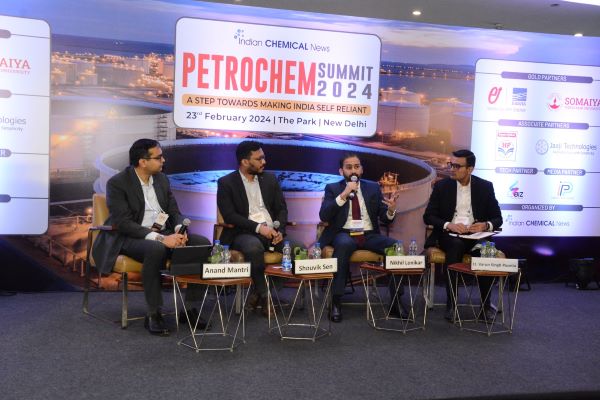By embracing sustainability as a guiding principle, the India's petrochemical industry can chart its course towards a brighter future

In the face of global climate challenges, the Indian petrochemical industry is pivoting towards sustainable practices and net zero emissions. As it navigates the complex terrain of sustainability, green practices, and net zero emissions, bold leadership and collective action are paramount. With unwavering dedication and collaboration, the industry has the potential to emerge as a global leader in sustainability.
In this context, the leading experts delved into the imperative of sustainability, green initiatives, and the pursuit of net zero emissions at the first session, ‘Sustainability, Green, and Net Zero for Indian Petrochemical Industry’ of PetroChem Summit 2024 organized by the Indian Chemical News in New Delhi on February 23, 2024 in New Delhi.
The session was moderated by Anand Mantri, Project Principal, Kearney.
Outlining the need for embracing the latest technologies to join the sustainable pathway, Nikhil Lonikar, Regional Marketing Manager-Sustainability, India, Ebara Elliott Energy said, “At Ebara we have set the goals of achieving 55% reduction of greenhouse gases (GHG) and carbon neutrality by 2050. We are developing new technologies in terms of reducing fossil usage. In this context, we offer Carbon Capture, Utilization, and Storage (CCUS), Renewable Energy Integration, Biobased Feedstock, Advanced Process Technologies, Biorefineries, Waste to Technology, Carbon neutral H2 production, Digitalization and AI.”
“In terms of hydrogen, the government has earmarked a large budget. New players are entering this space. We are contemplating developing a solution for H2 compression. We are at the verge of developing a solution for compressing pure hydrogen. The convention route is no longer relevant as the technology provides regular engagement with stakeholders including academia to develop solutions that are closer to customer expectations,” Lonikar added.
Calling for sustainable solutions to tackle the emissions caused by the industry, Lt. Varun Singh Poonia, Petrochemical Expert said, “Significant CO2 emissions are coming from the chemical and petrochemical industry. If the upstream and downstream industries are combined, the emissions will be even higher. While carbon capture is going well, the transportation and supply chain is a huge challenge before the industry players.”
Suggesting the possible solutions, he added: “The cost for relevant technologies needs to be optimized for increased adoption. As the players are currently working in silos, the collaborative model would work well for all the stakeholders. At the same time, the system needs to be energy efficient and sufficient. Focus should be on the biomass related options where pilot projects aren’t moving to large scale due to cost consideration. As we move forward, we have to change our perspective on technology development.”
Sharing his outlook, Shouvik Sen, Project Leader, BCG said, “There has been a US $700-800 billion investment in the development of technologies that will be based on efficiency, AI and renewable capacity. Carbon capture will be playing a bigger role going forward. At the same time, among the key issues that need attention include electrification of crackers and challenges within the value chain.”
“Most of the technologies including electrolysis and bioethanol are 30-40 years old and this calls for the development of newer options. As our feedstock is competing with global alternatives, we need to create the feedstock that is comparatively cost effective and sustainable. Multiple factors including supply chain are a factor too in the overall scenario. In terms of demand for hydrogen, it will come mostly from the process industry. To help the industry create better solutions, government policy too will have to play an important role,” Sen added further.
“To meet the growing demand of petrochemicals, India will need one cracker plant each year to sustain the growth. Owing to the country's growing domestic ethylene capacity, the development of crackers will require huge investment as well,” commented Anand Mantri, Project Principal, Kearney.
The PetroChem Summit 2024 themed, ‘A step towards making India self-reliant’, witnessed attendance by leading industry experts and stakeholders from the petrochemical chemical sector across India.
Gold partners of the summit were Ebara Elliott Energy, and Somaiya Vidyavihar University. Associate partners were Hindustan Petroleum and Jaaji Technologies.
Subscribe to our newsletter & stay updated.